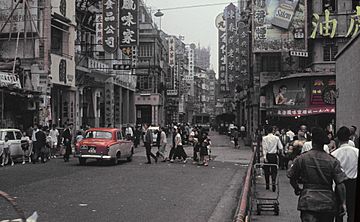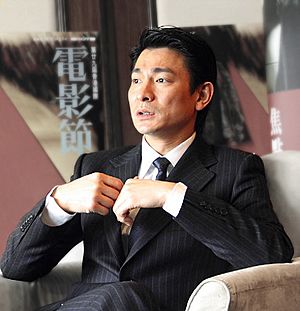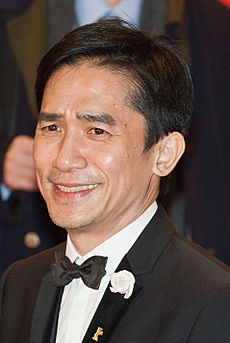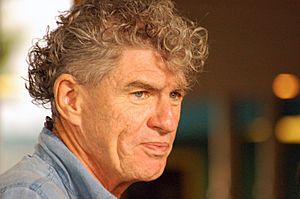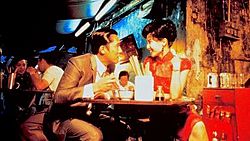Wong Kar-wai facts for kids
Quick facts for kids
Wong Kar-wai
|
|||||||||||||||||
|---|---|---|---|---|---|---|---|---|---|---|---|---|---|---|---|---|---|
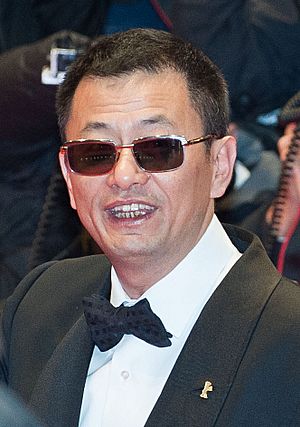
Wong at the 2013 Berlin Film Festival
|
|||||||||||||||||
| Born | 17 July 1958 Shanghai, China
|
||||||||||||||||
| Occupation |
|
||||||||||||||||
| Years active | 1982–present | ||||||||||||||||
| Spouse(s) | Esther | ||||||||||||||||
| Children | 1 | ||||||||||||||||
| Awards | Full list | ||||||||||||||||
| Chinese name | |||||||||||||||||
| Traditional Chinese | 王家衛 | ||||||||||||||||
| Simplified Chinese | 王家卫 | ||||||||||||||||
|
|||||||||||||||||
| Signature | |||||||||||||||||
 |
|||||||||||||||||
Wong Kar-wai BBS (born 17 July 1958) is a famous film director, screenwriter, and producer from Hong Kong. His movies are known for their unique stories that don't always go in a straight line. They also feature amazing music and bright, colorful pictures.
Wong is a very important person in Hong Kong cinema. Many people see him as a top filmmaker. In 2002, Sight & Sound magazine ranked him as the third greatest director of the past 25 years. His films often appear on "best of" lists around the world.
Wong was born in Shanghai, China. He moved to Hong Kong with his family when he was a child. He started his career writing scripts for TV shows. Then, he began directing films. His first movie was the crime drama As Tears Go By (1988). This film was quite popular in Hong Kong.
After his first film, Wong decided to make movies in his own special style. His next film, Days of Being Wild (1990), didn't do well at the box office. However, critics loved it! It won Best Film and Best Director at the 1991 Hong Kong Film Awards. His 1994 film, Ashes of Time, was a martial arts movie. It had a mixed reaction because its story was a bit confusing.
After the long work on Ashes of Time, Wong made a smaller, quicker film called Chungking Express (1994). He hoped it would help him love filmmaking again. This movie was more lighthearted and made Wong famous around the world. It won Best Film and Best Director at the 1995 Hong Kong Film Awards. Wong then made the crime thriller Fallen Angels in 1995. At first, critics weren't sure about it. But now, it's seen as a classic movie from Hong Kong's Golden Age of cinema. Wong became even more famous worldwide with his 1997 drama Happy Together. For this film, he won Best Director at the Cannes Film Festival.
His 2000 drama In the Mood for Love really showed off Wong's unique style. It's loved for its beautiful visuals and subtle storytelling. Some of his other famous works include 2046 (2004) and The Grandmaster (2013). Both of these films won many awards.
Contents
Growing Up in Hong Kong
Wong Kar-wai was born on July 17, 1958, in Shanghai. He was the youngest of three children. When he was five, his parents decided to move to Hong Kong. His older brother and sister were supposed to join them later. But the borders closed, and Wong didn't see them for ten years.
In Hong Kong, his family settled in Tsim Sha Tsui. His father managed a nightclub. Wong felt lonely as a child in this new city. He found it hard to learn Cantonese and English at first. He became fluent in these languages when he was a teenager.
As a young boy, Wong's mother often took him to the movies. He watched many different kinds of films. He later said, "The only hobby I had as a child was watching movies." In school, he liked graphic design. He earned a diploma in this subject from Hong Kong Polytechnic in 1980. After graduating, Wong joined a training course at the TVB television network. There, he learned how movies and TV shows are made.
Starting His Film Journey
Early Career (1980–1989)
Wong soon started writing scripts. He first wrote for TV series and soap operas. Then, he moved on to writing film scripts. He worked with a team, writing for many types of movies. These included romance, comedy, thrillers, and crime films. Wong wasn't very excited about these early projects. But he kept writing throughout the 1980s. He wrote for films like Just for Fun (1983) and Rosa (1986). He is officially credited with ten screenplays. But he says he worked on about fifty more without getting credit. Wong spent two years writing the script for Patrick Tam's action film Final Victory (1987). This script earned him a nomination at the 7th Hong Kong Film Awards.
By 1987, the Hong Kong film industry was doing very well. It was making many successful movies. New directors were needed to keep this success going. Wong was invited to join a new independent company called In-Gear. He was given the chance to direct his own movie. Gangster films were popular then, thanks to John Woo's hit A Better Tomorrow (1986). Wong decided to make one too, but he focused on young gangsters.
His first film, As Tears Go By, tells the story of a young man who has to look after his wild friend. Wong had a lot of freedom making this film. He cast popular young stars like singer Andy Lau, Maggie Cheung, and Jacky Cheung. As Tears Go By came out in June 1988 and was a hit with audiences. Critics noted that Wong's film stood out from other crime movies. It had a more emotional and atmospheric feel. The film was even shown at the 1989 Cannes Film Festival.
Finding His Own Style (1990–1994)
For his next film, Wong wanted to try something different. He didn't want to make another crime movie. The success of As Tears Go By allowed him to do this. He decided to set his new film, Days of Being Wild, in the 1960s. This was an era he remembered well and felt a "special feeling" for. The movie is about a young man named Yuddy who feels lost, and the people around him. It doesn't have a simple plot. Instead, it explores themes of longing for love. Andy Lau, Maggie Cheung, and Jacky Cheung returned for this film. Leslie Cheung played the main character. Christopher Doyle joined as the cinematographer. He became a very important partner for Wong, filming his next six movies.
Even with popular stars, Days of Being Wild was not a typical mainstream movie. It focused more on feelings and atmosphere than on a clear story. The film was released in December 1990. It didn't make much money and critics had mixed feelings. However, it won five Hong Kong Film Awards. It also started to get attention internationally. With its experimental story and beautiful camera work, Days of Being Wild is seen as the first true "Wong Kar-wai film." It is now considered one of Hong Kong's best movies. Its initial failure was tough for Wong. He couldn't get money for a planned sequel.
To get more control over his work, Wong started his own company, Jet Tone Films, in 1992. He then accepted an offer to make a martial arts film. This film was based on the popular novel The Legend of the Condor Heroes. Wong was excited to make a costume drama. But he only used a few characters from the book. He started filming in 1992 with another all-star cast. Leslie, Maggie, and Jacky Cheung returned. Also joining were Brigitte Lin, Carina Lau, Charlie Young, and Tony Leung Chiu-wai. Tony Leung became another key partner for Wong.
The film, Ashes of Time, is set during the Song dynasty. It's about an assassin living in the desert who helps different people. The movie took two years to finish and cost a lot of money. When it came out in September 1994, audiences found the story confusing. Critics generally liked that Wong tried something new with the martial arts genre. The film won several local awards. Christopher Doyle won Best Cinematography at the Venice Film Festival. In 2008, Wong re-edited the film and released it as Ashes of Time Redux.
Becoming World Famous (1994–1995)
During the long making of Ashes of Time, Wong had a two-month break. He was waiting for equipment to arrive. He felt a lot of pressure and worried about another film failing. So, he decided to start a new project. He said, "I thought I should do something to make myself feel comfortable about making films again. So I made Chungking Express, which I made like a student film." This new movie was planned and finished in just six weeks. It was released two months before Ashes of Time.
Chungking Express has two main parts. Both are set in modern Hong Kong. They focus on lonely policemen (Takeshi Kaneshiro and Tony Leung Chiu-wai). Each policeman falls for a woman (Brigitte Lin and Faye Wong). Wong wanted to try "two crisscrossing stories in one movie." He worked very spontaneously. He filmed at night what he had written that same day. Chungking Express is much more fun and lighthearted than Wong's earlier films. But it still explores similar themes. At the 1995 Hong Kong Film Awards, it won Best Picture. Wong also received Best Director. An American company, Miramax, bought the film for distribution. This made Wong famous around the world.
Wong kept working without a break. He expanded on his ideas from Chungking Express for another film. This new movie was also about lonely young adults in modern Hong Kong. Chungking Express was originally planned to have three stories. But when time ran out, Wong developed the third story into a new film, Fallen Angels. He saw both films as two parts of one larger story about Hong Kong.
Fallen Angels is a crime thriller with some intense scenes. But it's not a typical crime movie. It has Wong's unique, fragmented style. The story also has two main parts that subtly overlap. The film mostly takes place at night. It explores the darker side of Hong Kong. Wong planned this to balance the sweetness of Chungking Express. Takeshi Kaneshiro and Charlie Young were in this film again. New actors included Leon Lai, Michelle Reis, and Karen Mok. When it was released in September 1995, some critics felt it was too similar to Chungking Express. But over time, critics changed their minds. Fallen Angels has become a cult classic. It is known as one of Wong's most stylish and iconic films.
Becoming Widely Recognized (1996–2000)
Wong's fame grew steadily in the early 1990s. But his international standing became very strong with the 1997 romantic drama Happy Together. The film's creation was influenced by the handover of Hong Kong from Britain to China that year. Wong chose to film in Argentina, away from the pressure of addressing the handover directly. However, the film still explored important themes. He decided to focus on a relationship between two men. He wanted to show their relationship as normal and universal.
Happy Together tells the story of a couple (Tony Leung Chiu-wai and Leslie Cheung). They travel to Buenos Aires to try and save their relationship. Wong decided to change his usual style for this film. The story is more straightforward. There are only three characters, and no women. While it still has beautiful photography, it's more controlled. The film had a difficult production. It was supposed to take six weeks but lasted four months. It was released in May 1997 and received great reviews. It competed for the top prize at the Cannes Film Festival. Wong became the first Hong Kong director to win the Best Director Award there.
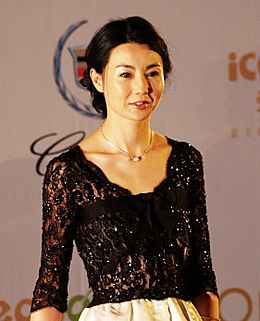
In 2005, a film critic said that Happy Together marked a "new stage" in Wong's artistic journey. He believed that this film, along with In the Mood for Love (2000), showed Wong at his best. In the Mood for Love took two years to make. Wong had many different ideas for the film before it became the final romantic drama. It's set in 1960s Hong Kong and is seen as a follow-up to Days of Being Wild. Wong returned to an era he loved. He focused on people from Shanghai who had moved to Hong Kong.
Filming lasted 15 months. Both Maggie Cheung and Tony Leung were pushed to their limits. Wong shot more than 30 times the amount of footage he actually used. He finished editing the film just hours before its premiere at Cannes. At the festival, In the Mood for Love won a special technical award. Tony Leung won Best Actor. Wong said it was his most difficult but also most important film. In later years, it has been called one of the greatest films of all time.
Working Internationally (2001–2007)
In the Mood for Love took two years to make. Its sequel, 2046, took twice as long. Wong had the idea for 2046 first. The title referred to the last year of China's "One country, two systems" promise to Hong Kong. Even though his plans changed, he filmed parts of 2046 at the same time as In the Mood for Love. He continued working on it right after In the Mood for Love was finished. It became a huge project that was hard to complete.
2046 continues the story of Chow Mo-wan, Tony Leung's character from In the Mood for Love. But in this film, he is much colder. Wong felt he didn't want to leave the character. He started where he left off in 1966. But he said, "It's another story, about how a man faces his future due to a certain past." His plans were not very clear. The film was shot in many different cities. Actresses Zhang Ziyi and Gong Li played the women who enter Mo-wan's life. He is also writing a science fiction novel called 2046. The film premiered at the 2004 Cannes Film Festival. But Wong delivered the film very late. He kept editing it even after its release in October. 2046 was Wong's most expensive and longest project so far. It didn't do well financially in Hong Kong. But most Western critics gave it good reviews.
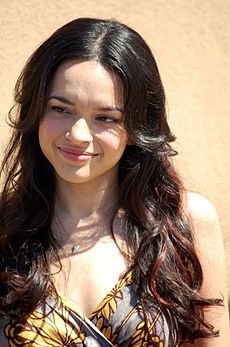
After the tough making of 2046, Wong wanted his next film to be simpler. He decided to make an English-language film in America. He thought it would be "refreshing" to work in a new place. He heard singer Norah Jones on the radio and asked her to be the lead actress. Wong didn't know much about America. So, he co-wrote the script with author Lawrence Block. The film, My Blueberry Nights, is about a young New Yorker. She goes on a road trip after finding out her boyfriend cheated. She meets characters played by Jude Law, Natalie Portman, Rachel Weisz, and David Strathairn.
Filming for My Blueberry Nights took seven weeks in 2006. It was shot in places like Manhattan, Memphis, and Las Vegas. Wong made the film in the same way he would in Hong Kong. The themes and visual style remained similar. The film premiered in May 2007. It was Wong's fourth film in a row to compete for the top prize at Cannes. However, My Blueberry Nights did not get good reviews. Critics said the story was weak. It became Wong's first film to be considered a critical failure.
Recent Work (2008–Present)
Wong's next film, The Grandmaster (2013), took five years to make. It was another long and difficult production. This film is about the life of the martial arts teacher Ip Man. Wong had the idea in 1999. But he didn't start working on it until after My Blueberry Nights. Ip Man is a famous figure in Hong Kong. He is known for teaching actor Bruce Lee the martial art of Wing Chun. Wong decided to focus on an earlier part of Ip's life (1936–1956). This period covered the difficult times of the Second Sino-Japanese War and World War II. Wong wanted to make a "commercial and colourful film."
After much research, filming began in 2009. Tony Leung Chiu-wai joined Wong for their seventh film together. Tony spent 18 months training in Wing Chun. The production was very hard and lasted three years. Tony broke his arm twice. This was Wong's most expensive film to date.
The Grandmaster mixes popular film styles with art film elements. Its visuals and themes are similar to Wong's other works. There are three different versions of the film. Wong made it shorter for the 2013 Berlin Film Festival and again for its US release. Critics said it was Wong's most easy-to-understand film since his first one. The Grandmaster won twelve Hong Kong Film Awards, including Best Film and Best Director. It also received two Academy Award nominations. Critics liked the film. It earned US$64 million worldwide, making it Wong's most successful film financially.
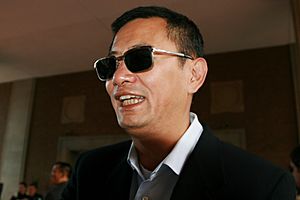
In 2014, Wong said he felt he was "only halfway done" with his career. In 2016, it was announced he would direct a film about the murder of Maurizio Gucci. But in 2017, he said he was no longer involved. In 2017, Amazon Video ordered a TV drama called Tong Wars. Wong was set to direct it. It was about gang wars in 19th-century San Francisco. But Amazon later canceled the series.
In May 2019, Wong announced that all his films would be restored in 4K. These restored films were released in 2021. This celebrated the 20th anniversary of In the Mood for Love. The restoration was done by a special film lab in Italy. Criterion Collection released Wong's restored films as a box set in the United States in March 2021. On December 27, 2023, Wong's first TV series, Blossoms Shanghai, aired. It is based on a book by Jin Yucheng. The series follows a businessman named A Bao (Hu Ge) in Shanghai.
Personal Life
In 1981, Wong met Esther Chen, a TV producer, at a bar. She suggested he apply for a director training program. Esther also helped Wong sell his first film scripts. In 1985, Wong married Chen in Hong Kong. She later became his producer and partner. In 1997, they had a son in Hong Kong. In 2017, Wong received an award in France. He called his wife his "muse." He said, "Of all the great female characters I have created in my films, there are always glimpses of her there. That is the reason why her name is always the first to appear onscreen in all of my films."
How Wong Makes Films
Inspirations
Wong doesn't often share his favorite directors. But he says he watched many different films growing up. These included Hong Kong movies and European art films. He was influenced by all of them. The energy of Hong Kong films had a huge impact on him. Some of his international influences include Martin Scorsese and Alfred Hitchcock. He is often compared to French director Jean-Luc Godard. Wong's most direct influence was his friend Patrick Tam. Tam was an important mentor and likely inspired Wong's use of color.
Outside of movies, Wong is greatly influenced by books. He especially likes writers from Latin America. The way his films are structured, often in fragments, comes from the "scrapbook structures" of novels by writers like Gabriel García Márquez. The Japanese writer Haruki Murakami also inspired him. The TV channel MTV was another influence. Wong said in 1998, "In the late eighties, when [MTV] was first shown in Hong Kong, we were all really impressed with the energy and the fragmented structure. It seemed like we should go in this direction."
His Unique Method
Wong has a very unusual way of making movies. He often starts filming without a full script. He relies on his feelings and ideas that come up during filming. He says he dislikes writing and finds filming from a finished script "boring." He writes the story as he shoots it. He gets ideas from the music, the location, and his actors. Actors are given only a basic idea of the plot. They are expected to develop their characters as they film. Wong doesn't allow rehearsals. He wants to capture natural and spontaneous moments. He also doesn't use storyboards or plan camera positions. He prefers to experiment as he goes. This means he shoots a lot of footage, sometimes 40 takes for one scene. Because of this, his films often go over schedule and over budget. Actor Tony Leung says this way of working is "taxing on the actors." But his partners say they endure it because the results are always surprising and interesting.
Even though Wong controls every part of filmmaking, he works closely with a few people. He said in 2013, "It is always good to work with a very regular group of people because we know how high we can fly and what are the parameters, and it becomes very enjoyable." Two key people help him create his unique look: production designer William Chang and cinematographer Christopher Doyle. Chang has worked on every Wong film. He is in charge of all set designs and costumes. Doyle filmed seven of Wong's projects. He is praised for his "masterful use of light and color." Wong's other regular partners include producer Jacky Pang and assistant director Johnnie Kong.
Wong also often casts the same actors. He is strongly linked with Tony Leung Chiu-wai. Tony has been in seven of Wong's feature films. Wong calls him a partner. He says they understand each other without needing many words. Other actors who have been in at least three of his films include Maggie Cheung, Chang Chen, Leslie Cheung, Jacky Cheung, and Carina Lau.
His Filmmaking Style
Wong is known for making art films that focus on feelings and atmosphere. His general style is like a "kaleidoscope of colors and identities." His films often have fragmented and disconnected stories. They don't always follow a straight timeline. Critics often point out that his films have less plot and more visual expression. Wong says that in his own way, there is a storyline.
A key part of Wong's films is their visual style. It is often called beautiful and unique. The colors are bold and bright. The camera work is flowing. One of his special techniques is called step-printing. This changes the film speed to make colors look like streaks of light. Other features of his style include slow motion, unusual camera angles, and filming in the dark or rain. He loves to play with film speed and exposure.
Another trademark of Wong's films is his use of music and pop songs. He thinks music is very important. It helps guide the rhythm of the editing. He chooses international songs, not just local pop music. He uses them to create a sense of history or place. Music is crucial to the emotional appeal of his films.
Wong's use of music and his highly visual style have been compared to music videos. Some critics say his films are "all surface and no depth." But others argue that his style is the substance. They believe his unique look serves the characters, themes, and emotions of the story.
Music and Feelings in Films
In Wong's movies, music is more than just background sound. It's a key part of the story. It adds deeper feelings to what you see and hear. Music and the story work together to create his special film language. This helps viewers feel emotions not just from the plot, but also from the sounds.
Music as Emotional Expression
In Wong's films, music often shows what characters are feeling. In In the Mood for Love, a song called Yumeji's Theme plays often. It's not just background music. It shows the characters' unspoken desires, loneliness, and hidden feelings. The music repeats, just like the unresolved tension between the two characters. It helps express their inner struggles and complex emotions.
Music and the Flow of Time
Wong is great at using music to show time passing. It's as if the music itself marks moments and feelings. In Chungking Express, the song California Dreamin' by The Mamas & The Papas is used many times. It shows the characters' loneliness. It also shows their wish to escape and their longing for something unknown. The music becomes a time marker. It links the characters' feelings to the rhythm and melody of time.
Music as a Cultural Clue
In Happy Together, Argentine tango music is used. This music reflects both the place and the difficult relationship between the two main characters. The strong and passionate rhythm of tango matches their intense and broken connection. Here, music shows personal feelings. But it also creates a sense of place. It highlights how lonely the characters feel in a foreign country.
Music and Inner Worlds
Wong often uses music to show what characters are thinking and feeling inside. In 2046, he mixes classical music, opera, and jazz. This mix shows the characters' complex feelings. These range from hidden emotions to longing for the past and strong desires. Changes in the music style show how the characters' minds change. This makes their inner struggles feel more real. Music acts as a direct emotional language. It helps the audience connect more deeply with the characters' inner journeys.
Wong Kar-wai's Impact
Wong is a very important person in today's cinema. He is seen as one of the best filmmakers of his time. Early in his career, he was called a "daring avant-garde filmmaker" in Chinese cinema. Authors Zhang and Xiao said he "occupies a special place in contemporary film history." They noted he had already made a "sizeable impact." After Happy Together and In the Mood for Love, Wong's international fame grew even more. In 2002, the British Film Institute named him the third greatest director of the past 25 years. In 2015, Variety called him an icon of art films.
Wong's movies are among the most famous and praised Hong Kong films around the world. Because of his global success, Wong is a key figure in his local film industry. He is seen as a "beacon of Hong Kong cinema" who keeps the industry in the public eye. He is also known for being a bit rebellious. He makes art films that also get shown in regular cinemas. He often takes well-known film types and changes them with his experimental techniques.
Film experts say Wong has one of the most unique filmmaking styles. From his first film, As Tears Go By, his "liquid" visual style made an impact. It was new and quickly copied in Asian films and TV. His second film, Days of Being Wild, is called a "landmark in Hong Kong cinema" for its unusual approach. Wong's films are very personal, making him an auteur (a director with a very distinct style). He has created his own "cinematic vocabulary." His success shows how important it is to be "different."
Wong's films often appear on "best of" lists. In 2005, a Hong Kong film group listed his films among the "Best 100 Chinese Motion Pictures." Days of Being Wild (1990) was ranked third, the highest for a film after the 1980s. In a 2012 Sight & Sound poll, In the Mood for Love was ranked 24th among the greatest films of all time. It was the highest-ranked film made since 1980.
Wong has influenced many modern directors. These include Quentin Tarantino, Sofia Coppola, and Barry Jenkins. In 2018, Harvard University gave him an honorary degree.
Films and Awards
Wong has directed ten feature films. He has also been credited as a screenwriter for 16 films. He directed one TV series and produced seven films for other directors. He has also made commercials, short films, and music videos. He has won awards and nominations from groups in Asia, Europe, North America, and South America. In 2006, Wong received the Legion of Honour from the French Government. In 2013, he was given the highest honor, Commander of the Ordre des Arts et des Lettres, by France. The International Film Festival of India gave Wong a Lifetime Achievement Award in 2014.
| Year | Title | Chinese title |
|---|---|---|
| 1988 | As Tears Go By | 旺角卡門 Wong gok ka moon |
| 1990 | Days of Being Wild | 阿飛正傳 Ah fei zing zyun |
| 1994 | Chungking Express | 重慶森林 Chung Hing sam lam |
| Ashes of Time | 東邪西毒 Dung che sai duk | |
| 1995 | Fallen Angels | 墮落天使 Do lok tin si |
| 1997 | Happy Together | 春光乍洩 Chun gwong cha sit |
| 2000 | In the Mood for Love | 花樣年華 Fa yeung nin wa |
| 2004 | 2046 | — |
| 2007 | My Blueberry Nights | — |
| 2013 | The Grandmaster | 一代宗師 Yi dai zong shi |
| Year | Title | Chinese title |
|---|---|---|
| 2023–2024 | Blossoms Shanghai | 繁花 |
See also
 In Spanish: Wong Kar-wai para niños
In Spanish: Wong Kar-wai para niños


